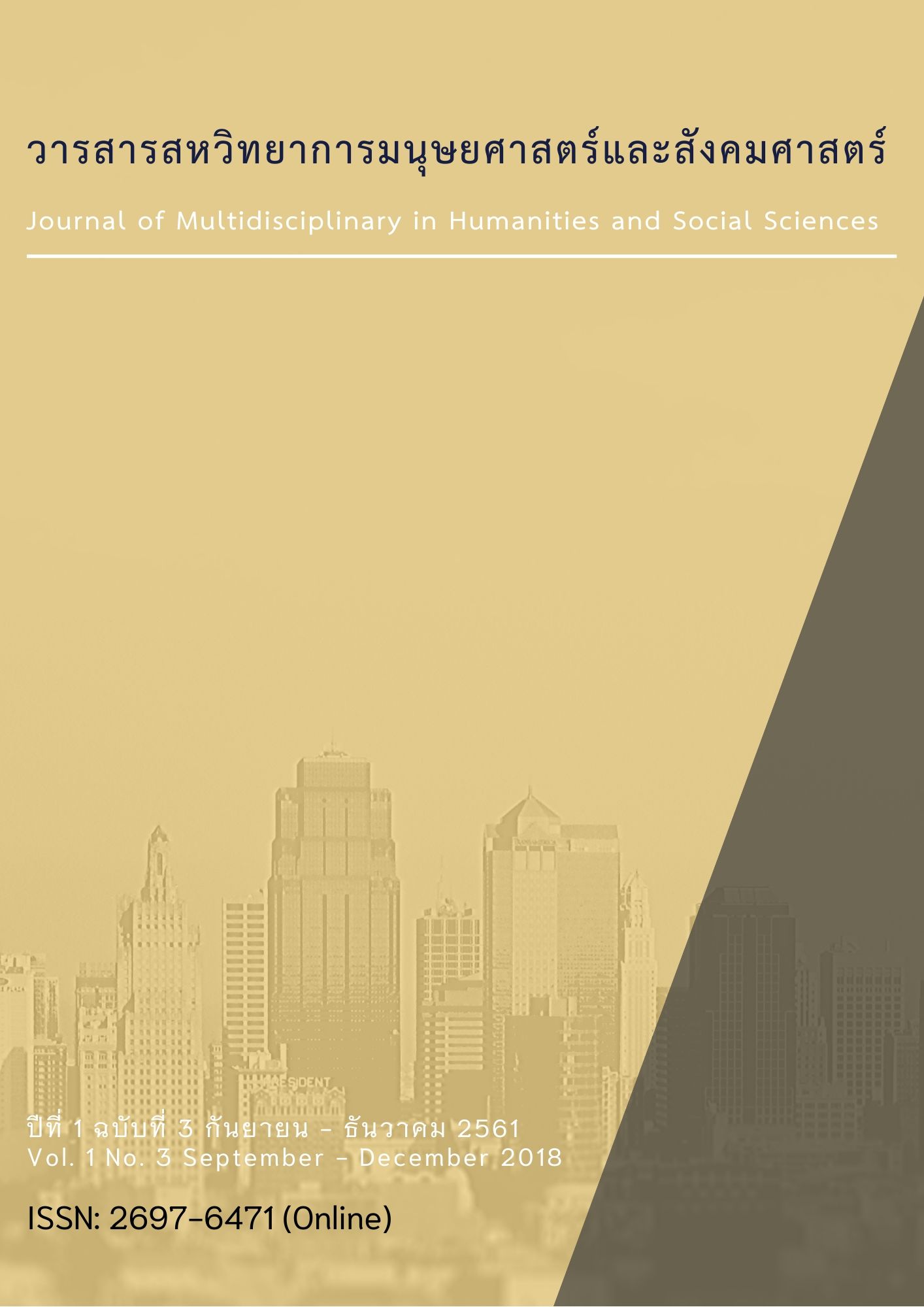Characteristics of Transformational Leadership of School Administrators
Main Article Content
Abstract
The world society has changed rapidly. Every country around the world has a convenient
to communicate and exchange of news and information. All over the world there is cooperation in
all aspects, In terms of economy, politics, society, and business, and education, technology, with
fast and intense. Thailand as members of the world will inevitably be affected must change in
every dimension to be able to remain amidst the variation of this world. Especially the ability to
compete to create economic stability is the key leading to national security and is the goal of
sustainable development which requires manpower, technology and conscience of society. The
best tool to development achieve the goal is education because education is an activity aimed an
intellectual development and ability to perform. But previous education quality was not as
successful as it should be. And the results of the quality of education management in the country
are not satisfactory.
"Leader" is an important person in the organization. Have a role that needs to be taken
under the conditions of the surrounding conditions. Especially the world has changed rapidly. So
the knowledge of "leadership" is very important for every organization. In a globalized world,
technology is accelerated rapid changes in society from the past to the present. Organization must
change ourselves all the time. "Leaders" and "Leadership" are important factors that should be
developed on neutral and maintaining balance of various elements management priorities are very
important for life at the individual level and at the leader level. "Balanced leadership" is a new
leadership style that has been synthesized from 5 fundamental leadership theories in order to
have characteristics that are consistent with globalization and the world in the next decade. The
important thing is: Skills of prioritizing management innovation and maintaining balance of various
factors must be adapted.
Article Details
Views and opinions appearing in the Journal it is the responsibility of the author of the article, and does not constitute the view and responsibility of the editorial team.
References
ครั้งที่ 2). กรุงเทพฯ โอเพ่นเวิลด์ส พับลิซซิ่ง เฮาส์ จำกัด.
ปรเมธี วิมลศิริ. (2559). ยุทธศาสตร์ชาติ 20 ปี อนาคตประเทศไทย เพื่อความมั่นคง มั่งคั่ง ยั่งยืน. เอกสารประกอบการบรรยาย วันศุกร์ที่ 26 สิงหาคม 2559.
เพียรชันธ์ กิจพาณิชย์เจริญ (2552). ศึกษาสมรรถนะการบริหารวิชาการของผู้บริหารสถานศึกษา สำนักงานเขตหนองแขม กรุงเทพมหานคร. สารนิพนธ์การศึกษามหาบัณฑิต (การบริหารการศึกษา). บัณฑิตวิทยาลัย มหาวิทยาลัยศรีนครินทรวิโรฒ.
ไพฑูรย์ สินลารัตน์. (2557). เพื่อความเป็นเลิศของการครุศึกษาไทย.กรุงเทพฯ: มหาวิทยาลัยธุรกิจบัณฑิตย์.
ไมตรี คงนุกูล. (2551). การศึกษาภาวะผู้นำแห่งการเปลี่ยนแปลงของผู้บริหารโรงเรียนนานาชาติ กรุงเทพ. สารนิพนธ์การศึกษามหาบัณฑิต (การบริหารการศึกษา). บัณฑิตวิทยาลัย มหาวิทยาลัยศรีนครินทรวิโรฒ.
วิโจน์ สารรัตนะ. (2560). ภาวะผู้นำ : ทฤษฎีและนานาทัศนะร่วมสมัยปัจจุบัน. กรุงเทพฯ: ทิพยวิสุทธิ์.
วิโรจน์ สารรัตนะ. (2556). การวิจัยทางการบริหารการศึกษา. (พิมพ์ครั้งที่ 3). กรุงเทพฯ: ทิพยวิสุทธิ์.
ศุภลักษณ์ เสรีรัตน์ และคณะ. (2550). การพัฒนาระบบบริหารที่มุ่งเน้นความเป็นเลิศของสถานศึกษาเอกชน. วิทยานิพนธ์ปริญญาดุษฎีบัณฑิต สาขาวิชาบริหารการศึกษาคณะครุศาสตร์ จุฬาลงกรณ์มหาวิทยาลัย
สมบัติ กุสุมาวลี. (2559). การสำรวจแนวคิดภาวะผู้นำในองค์กรระดับโลก ศึกษาจาก Harvard Business Review 2010-2012, การประชุมวิชาการระดับชาติในวันคล้ายวันสถาปนาสถาบันบัณฑิตพัฒนบริหารศาสตร์.
สังคม จันทร์วิเศษ. (2555). การพัฒนาตัวแบบปัจจัยที่มีอิทธิพลต่อภาวะผู้นำทางวิชาการของผู้บริหารสถานศึกษาขั้นพื้นฐาน. วิทยานิพนธ์ปริญญาปรัชญาดุษฎีบัณฑิต สาขาวิชาความเป็นผู้นำและการบริหารการศึกษา มหาวิทยาลัยราชภัฏสุรินทร์
สำนักนายกรัฐมนตรี.(2559). แผนพัฒนาการศึกษาของสำนักงานปลัดกระทรวงศึกษาธิการ. กรุงเทพฯ: กระทรวงศึกษาธิการ.
สุภัชชา พันเลิศพาณิชย์. (2558). บทความทางวิชาการ เรื่อง การพัฒนาภาวะผู้นำตามแนวทางปรัชญาเศรษฐกิจพอเพียง. ข้อมูลออนไลน์ https://www.gotoknow.org/posts/57315


